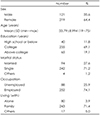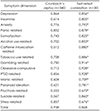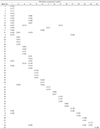1. Hong JP. The survey of mental disorders in Korea. Seoul: Ministry of Health and Welfare;2016.
2. Park JI, Jeon MN. The stigma of mental illness in Korea. J Korean Neuropsychiatr Assoc. 2016; 55:299–309.

3. Murray CJ, Lopez AD. Alternative projections of mortality and disability by cause 1990-2020: global burden of disease study. Lancet. 1997; 349:1498–1504.

4. Goldberg D. A classification of psychological distress for use in primary care settings. Soc Sci Med. 1992; 35:189–193.

5. Spitzer RL, Williams JB, Gibbon M, First MB. The structured clinical interview for DSM-III-R(SCID): I: history, rationale, and description. Arch Gen Psychiatry. 1992; 49:624–629.
6. Robins LN, Wing J, Wittchen HU, Helzer JE, Babor TF, Burke J, et al. The composite international diagnostic interview: an epidemiologic instrument suitable for use in conjunction with different diagnostic systems and in different cultures. Arch Gen Psychiatry. 1988; 45:1069–1077.
7. Zimmerman M, Coryell W, Corenthal C, Wilson S. A self-report scale to diagnose major depressive disorder. Arch Gen Psychiatry. 1986; 43:1076–1081.

8. Foa EB, Riggs DS, Dancu CV, Rothbaum BO. Reliability and validity of a brief instrument for assessing post-traumatic stress disorder. J Trauma Stress. 1993; 6:459–473.

9. Keller MB, Klerman GL, Lavori PW, Coryell W, Endicott J, Taylor J. Long-term outcome of episodes of major depression: clinical and public health significance. JAMA. 1984; 252:788–792.

10. Zimmerman M, Mattia JI. A self-report scale to help make psychiatric diagnoses: the psychiatric diagnostic screening questionnaire. Arch Gen Psychiatry. 2001; 58:787–794.

11. Jun SW, Jo HJ, Kim JB, Jung CH, Choi HK. Study on Standardization of Korean Version of Psychiatric Diagnostic Screening Questionnaire (K-PDSQ). Anxiety and Mood. 2013; 9:31–37.
12. Kim K, Kim J, Won H. Korean manual of symptom checklist-90-revision. Seoul: Jung Ang Juk Sung Publisher;1984. p. 8–10.
13. Kwon SJ. Korean-Symptom Checklist 95. Seoul: Jung Ang Juk Sung Publisher;2015. p. 1–39.
14. Bastien CH, Vallières A, Morin CM. Validation of the insomnia severity index as an outcome measure for insomnia research. Sleep Med. 2001; 2:297–307.

15. Cho YW, Song ML, Morin CM. Validation of a Korean version of the insomnia severity index. J Clin Neurol. 2014; 10:210–215.

16. Hirschfeld RM, Williams JB, Spitzer RL, Calabrese JR, Flynn L, Keck PE Jr, et al. Development and validation of a screening instrument for bipolar spectrum disorder: the Mood Disorder Questionnaire. Am J Psychiatry. 2000; 157:1873–1875.

17. Jon DI, Yoon BH, Jung HY, Ha KS, Shin YC, Bahk WM. A Validation Study of the Korean version mood disorder questionnaire (K-MDQ). J Korean Neuropsychiatr Assoc. 2005; 44:583–590.
18. Kim TS, Chung MY, Kim W, Koo YJ, Ryu SG, Kim EJ, et al. Psychometric properties of the Korean version of the short post-raumatic stress disorder rating interview (K-SPRINT). Psychiatry Clin Neurosci. 2008; 62:34–39.

19. Kim JS, Oh MK, Park BK, Lee MK, Kim GJ. Screening criteria of alcoholism by alcohol use disorders identification test (AUDIT) in Korea. Korean J Fam Med. 1999; 20:1152–1159.
20. An HK, Lee HJ, Jung DS, Lee SY, Kim SW, Kang JH. The reliability and validity of Korean version of questionnaire for nicotine dependence. J Korean Acad Fam Med. 2002; 23:999–1008.
21. Choi WC, Kim KB, Oh DY, Lee TK. A preliminary study on standardization of Korean form of South Oak Gambling Screening. J Korean Acad Addict Psychiatry. 2001; 5:46–52.
22. Koh KB, Park JK, Kim CH. Development of the stress response inventory. J Korean Neuropsychiatr Assoc. 2000; 39:707–719.
23. American Psychiatric Association. Diagnostic and Statistical Manual of Mental Disorders (DSM-5®). Washington DC: American Psychiatric Pub;2013.
24. Kline P. Handbook of psychological testing. 2nd ed. London: Routledge;2013.
25. Steer RA, Clark DA, Beck AT, Ranieri WF. Common and specific dimensions of self-reported anxiety and depression: the BDI-II versus the BDI-IA. Behav Res Ther. 1999; 37:183–190.

26. Berman MG, Peltier S, Nee DE, Kross E, Deldin PJ, Jonides J. Depression, rumination and the default network. Soc Cogn Affect Neurosci. 2011; 6:548–555.






 PDF
PDF ePub
ePub Citation
Citation Print
Print






 XML Download
XML Download